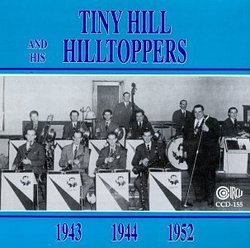| All Artists: Tiny Hill Title: 1943, 1944 & 1952 Members Wishing: 0 Total Copies: 0 Label: Circle Release Date: 8/12/1994 Genres: Jazz, Pop Style: Swing Jazz Number of Discs: 1 SwapaCD Credits: 1 UPC: 762247415527 |
Search - Tiny Hill :: 1943, 1944 & 1952
 | Tiny Hill 1943, 1944 & 1952 Genres: Jazz, Pop
|
Larger Image |
CD Details |
CD ReviewsGreat Collection .... But You Still Have To Wonder 08/10/2007 (5 out of 5 stars) "Between the two of them, Circle and Hindsight have three CDs out on Harry "Tiny" Hill with a total of 66 selections - and not one of them contains any of the eleven hit singles he registered between 1939 and 1952 for Vocalion, Okeh, Decca and Mercury. Well, technically, there is one, but on that volume it's culled from a radio broadcast and so is not the original.
Ordinarily, for that I would dock each at least one star, maybe two, but since none of them lay claim to presenting his greatest hits I can't. Still, you have to wonder why they would go to all the trouble of putting together three CDs covering a relatively obscure "cornball" band and not include the selections that at least brought him some measure of fame. This one, from the viewpoint of sound quality and information, is the best of the three so far, with a number of old standards performed in the unique comical style of this bandleader/vocalist, born in Illinois on July 19, 1906. His earliest aggregation was a trio way back in 1931, followed by a group called The Five Jacks, and in 1933 he formed his first big band, before joining Byron Dunbar's orchestra as a drummer in about 1935. In the late 1930's he formed another band, got a Vocalion recording contract, and in September 1939 had a # 14 hit with the novelty tune Doodle Doo Doo. A month later, Angry went to # 13, and in June 1940 I Get A Kick Out Of Corn topped out at # 28. Later that summer, after switching to Columbia's Okeh subsidiary, his version of Five Foot Two, Eyes Of Blue reached # 25, and in February 1941, The Guy At The End Of The Bar peaked at # 25. Three years later, in November 1944, How Many Hearts Have You Broken [With Those Great Big Beautiful Eyes?] reached # 14 on the Decca label. By 1946 he had relocated to Mercury and in February had one of three hit versions of Sioux City Sue which, b/w I'll Keep On Loving You, reached # 3 on the Most Played Juke Box Folk Records [MPJBFR], a forerunner of the Country charts, placing just back of those by Zeke Manners and The Hoosier Hot Shots with Two-Ton Baker [both # 2]. Pop hits of the song were by Bing Crosby & The Jesters [# 3], Tony Pastor [# 10], and Kate Smith [# 14], and ALL were covers of the late 1945 smash version by Dick Thomas whose National recording reached # 1 Country/# 16 Pop. Hill's next hit didn't come until almost exactly two years later when, billed as Tiny Hill And The Cactus Cutups, they had a # 5 Country with Never Trust A Woman b/w Behind The Eight Ball. Following that it would be three full years before his original version of Hot Rod Race, b/w Lovebug Itch, made it to # 7 Country in February 1951, as well as # 29 Pop. Covers by Arkie Shibley [# 5], Ramblin' Jimmy Dolan [# 7], and Red Foley [# 7] competed for air time and sales. In March his own cover of the 1950 Moon Mullican hit I'll Sail My Ship Alone peaked at # 10 Country b/w the old pop standard Back In Your Own Backyard, and in January 1952 he closed out his chart career when his rendition of Slow Poke [there were seven charted versions that year] topped out at # 28 Pop. More often than not, when someone is nicknamed Tiny it's because they are anything but, and that applies here in spades. He tipped the scales at 350 lbs, and that likely contributed to his death in 1972 at the relatively young age of 66. A collection of his hit singles and their B-sides would be a nice welcome to the field, but until then this volume will give you a good sampling of the happy, fun-filled music of one of that era's unsung Country bands." |

 Track Listings (25) - Disc #1
Track Listings (25) - Disc #1